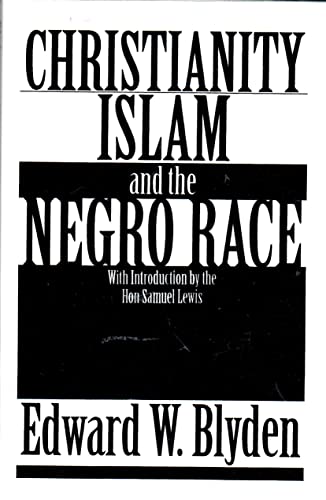Christianity, Islam and the Negro Race
Edward Wilmot Blyden LL.D.
BOOK REVIEW

In the riveting landscape of intellectual discourse, Edward Wilmot Blyden's Christianity, Islam and the Negro Race emerges not merely as a text, but as a fervent cry echoing through the ages, encapsulating the tumultuous relationship between faith and identity for people of African descent. This monumental work isn't just for those who tiptoe around religious tenets; it is for all who dare to confront the profound intersections of culture, spirituality, and race.
Blyden, a pioneering Pan-Africanist and a staunch advocate for African self-determination, illuminates the experiences of Black individuals navigating the historically fraught terrain of Christianity and Islam. His resonant arguments captivate you, forcing a reflection on the very fabric of racial identity woven through religious devotion. Blyden wasn't merely writing-he was igniting a revolution of thought, challenging his contemporaries and subsequent generations to question the prevailing narratives that framed Black spirituality.
Articulated with breathtaking eloquence, his exploration offers insight into how Christianity and Islam have sculpted the identities of the Negro race. Here lies the essence of his work: a bold assertion that to understand the Black experience, one must first comprehend the intricate dance between these two major faiths and their distinct impacts upon the psyche of an entire race. Blyden's perspective remains a radical challenge to the often Eurocentric narratives that dominate religious discourse, making Christianity, Islam and the Negro Race an indispensable text for anyone seeking to grapple with the complexities of faith and identity in a post-colonial context.
Your heart races as you uncover Blyden's unapologetic pride in African heritage, illuminating how both Christianity and Islam can serve not as tools of oppression, but as avenues for empowerment. He compellingly argues that these religions provide a framework through which African people can reformulate their identities, transcending the negative stereotypes imposed by colonial narratives. He insists that the true essence of the Negro race, far from being a footnote in history, is a powerful narrative filled with resilience, strength, and an innate yearning for spiritual fulfillment. 🌍
What makes Blyden's work particularly poignant is the historical context in which it was penned. Emerging during the 19th century, a time rife with colonialist intrusions, his voice is a counterweight to the prevailing sentiments of inferiority that plagued Black communities. As one reader insightfully remarked, "Blyden's thoughts are a beacon of hope, challenging us to redefine our narratives in a world eager to silence our voices."
But it's not all accolades; Blyden's work has faced its share of controversy. Critics assert that his fervent defense of religion sometimes leans towards a dismissal of the socio-political realities faced by Africans and their diasporas. They argue that in glorifying these faiths, he might overlook the direct consequences of colonialism on the spiritual practices indigenous to Africa. Yet, this very contention opens the door to deeper discourse on how we interpret faith within the dynamics of power and resistance.
As you delve into the pages, prepare for a journey that oscillates between the immense pride of African heritage and the harsh realities of colonial subjugation. Blyden's effervescent prose dances off the pages, beckoning you to immerse yourself fully in his world-where the sacred intertwines with the cultural, and where the struggles for identity are as pertinent today as they were over a century ago.
Moreover, while some may question the relevance of Blyden's ideas in today's context, a closer examination reveals a rich tapestry of thoughts that can inspire new generations in their quest for identity amidst an ever-evolving global landscape. The robust discussions spawned by his work continue to challenge sociopolitical structures, motivating activists from the civil rights movement to contemporary leaders who emphasize the merging of faith as a source of strength in the fight for justice.
This is not merely a book; it is an awakening. Each chapter urges you to confront uncomfortable truths about race and faith, drawing fresh colors on the canvas of understanding that shapes our societal landscape. Leaving no stone unturned, Blyden envelops you in an experience that is hard-hitting and transformative, compelling you to reconsider the ways in which religion has shaped the Black identity and continues to define, inspire, and sometimes, challenge it.
So, as you turn the pages of Christianity, Islam and the Negro Race, what you hold is not just a historical document faded with time, but a vivid, dynamic conversation that resonates with current events. Dive into this work that's far more than an exploration; it's a revolutionary manifesto that insists on our right to clarify our own narratives-an invitation to not just witness history but to actively engage in the ongoing dialogue that shapes our world today. 🔥
📖 Christianity, Islam and the Negro Race
✍ by Edward Wilmot Blyden LL.D.
🧾 432 pages
1994
#christianity #islam #negro #race #edward #wilmot #blyden #lld #EdwardWilmotBlydenLLD